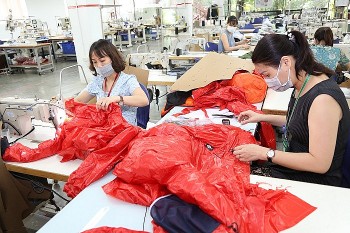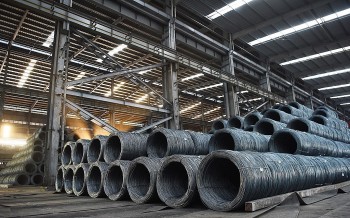How Can Vietnam's Economy Recover from Covid-19?
| Increasing Food Costs Affect CPI in Vietnam | |
| Vietnam’s Textile Industry to Miss Export Target Due to Covid | |
| Despite Covid, Vietnam’s Steel Industry Grows Thanks to Export |
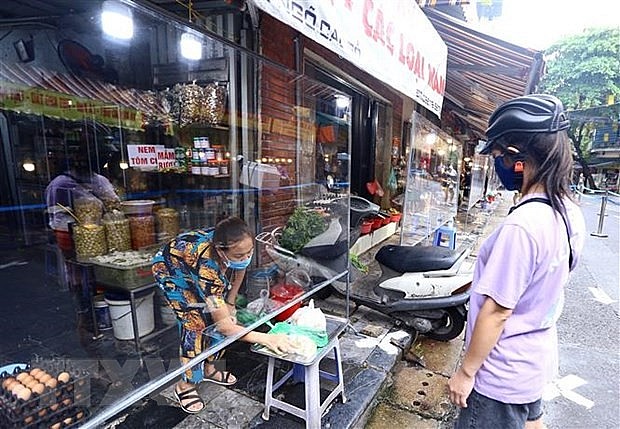 |
| Hang Be Market, Hanoi ensures both business and Covid-19 prevention. Photo: Hoang Hieu/VNA |
The fourth wave of the Covid-19 pandemic has posed significant challenges to the Vietnamese economy.
In particular, ensuring the production and supply chain of goods to meet both domestic demand and export is one of the extremely difficult tasks.
In its latest macroeconomic report, the World Bank (WB) estimates Vietnam's economic growth at around 4.8% for the whole of 2021. This forecast is 2 percentage points lower than the estimate. Previously, amid the Covid-19 pandemic, there were significant impacts on the economic activities of this Southeast Asian country.
JICA: Domestic resources are the "lifeline" of the economy
Commenting on Vietnam's economic prospects, JICA Chief Representative Shimizu Akira said that for a long time, Vietnam has always received a lot of attention and is considered as one of the countries with great potential to diversify global supply chains. However, in the immediate future, this economy is facing certain challenges.
Shimizu Akira said: “The fourth wave of the Covid-19 pandemic has impacted many suppliers who are Japanese assembly or manufacturing companies in Vietnam. While these manufacturers only supply certain items, because some companies have global operations, disruptions to the supply structure have had a significant impact on the global supply chain, including Vietnam. This is a very serious problem. I am aware that some companies have been forced to cut production compared to planned for global customers.”
According to Shimizu, the Covid-19 pandemic has highlighted the importance of policies to support domestic resources, including businesses and workers, to improve economic autonomy.
First, Vietnam needs to strengthen the strength of domestic enterprises to improve their competitiveness, he said, by equipping them with the ability to manufacture high-quality components and goods themselves. To help Vietnam achieve this goal, JICA is working closely with the Ministry of Planning and Investment to improve the capacity of domestic enterprises, enabling them to participate in the supply chain.
Second, the disruption to movement between countries shows how important it is to ensure that the number of managers, engineers, and workers in the country have the right capacity and skills to run the business of the enterprise seamlessly, without depending on a team of foreign experts.
For this purpose, JICA will continue to support the development of human resources for the industry in Vietnam through training courses on Japanese business models and capacity building for vocational schools. JICA believe these efforts will help the Vietnamese industry build a sustainable supply chain in the future.
World Bank: Digitization is the future
In the latest edition of the review report - Vietnam's economic update report for the first six months of 2021, the World Bank said that although downside risks have increased, fundamentals remain stable. and the economy could return to its pre-pandemic Gross Domestic Product (GDP) growth rate, between 6.5% and 7% from 2022 onwards.
 |
| Organized 100% free vaccination for more than 5,500 workers in Vietnam-Singapore Industrial Park. Photo: Chi Tuong/VNA |
This forecast is based on the assumption that the current outbreak will be gradually controlled, creating conditions for the economy to recover in the fourth quarter of 2021.
The World Bank's report said that to improve economic autonomy, in the coming time, Vietnam needs to take advantage of existing conditions to become a world factory in digital technology.
This is also the goal of the Government of Vietnam. Prime Minister Pham Minh Chinh has set a goal to put Vietnam in the group of 50 leading countries in information technology development as early as 2025. The Prime Minister also stated that the digital economy must contribute 1/3 of the country's GDP by the end of the decade, compared with just 5% today.
World Bank Lead Economist Jacques Morisset said: “Digital transformation is happening in Vietnam and the Covid-19 shock is a big driving factor. In fact, since the appearance of the Covid-19 pandemic, Vietnam has witnessed a great change in the application of new digitization tools in both the private and public sectors.
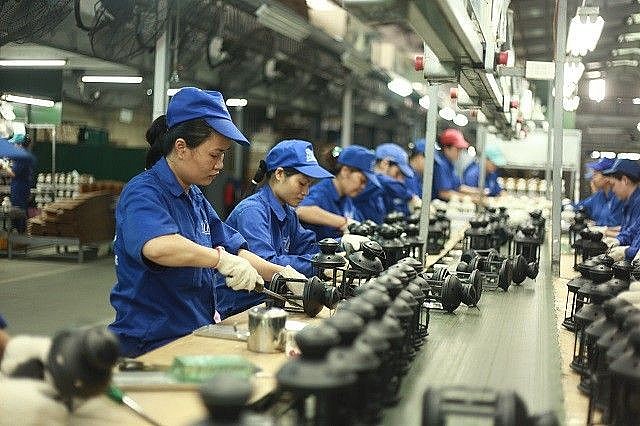 |
| Photo: WVR |
However, Morisset said that Vietnam still has a lot of work to do. In addition to upgrading infrastructure, Vietnam needs to encourage the application of digital technology and attract investment to create conditions for small businesses to participate in the digital economy, acquire and develop skills, protect privacy, and network security.
He said: "Besides upgrading the current digital technology infrastructure, Vietnam also needs to equip workers with digital skills and become more dynamic in adapting to modern new technologies.
In the short term, Vietnam can take advantage of the presence of many famous technology enterprises such as Intel, Apple or Samsung to learn and improve the digitalization capacity of the local workforce working for these corporations.
Along with that, the government can issue a series of initiatives to attract talent from expatriates working in digital technology fields around the world. This is what has been seen in countries and regions that are at the forefront of the digital economy such as Korea, the US and Europe.”
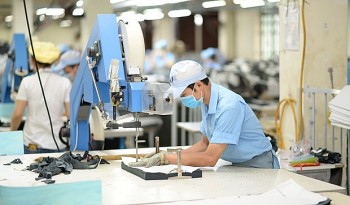 | Firms Offered Recommendations To Boost Exports To EU Europe is a large market for Vietnamese goods, but businesses need to grasp its quality standards and consumption trends so as to fully capitalize on ... |
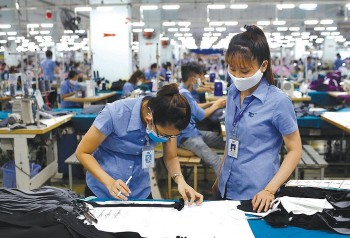 | High Global Demand Opens Up Opportunities For Vietnamese Producers Vietnamese producers have been put under pressure because of the complex developments of the pandemic, but, in risks, opportunities always exist. |
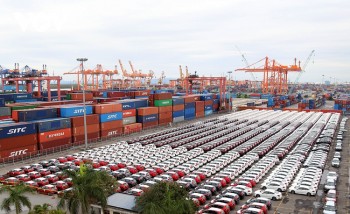 | Car Import to Vietnam Doubled Amidst Covid-19 A total of 14,407 CBU cars were imported to Vietnam in July, with a turnover of US$ 290.8 million. Combining the first seven months of ... |


